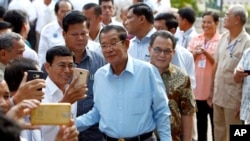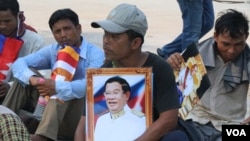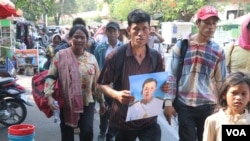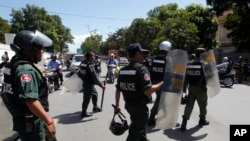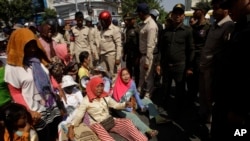Twelve years ago, Nget Sim, a Cambodian villager who lives along the Thai border in Chi Khor Leu commune of Koh Kong province, lost his 5 hectares of family farmland to a sugar company.
Sim, 36, is among hundreds of people who have been accused since 2006 of living on the Koh Kong Sugar Company’s land illegally after the government granted a large tract of land in 2006 to the well-connected CPP Senator Ly Yong Phat for an economic land concession. But even years after the dispute began, he says he is bereft without his land, which he received from his family as an inheritance when he got married.
“I don’t know what to do since I was farming on my land and then they came to grab it,” Nget Sim told VOA. “I don’t know what to do.”
Having land to farm crops, especially rice, is the most important thing in many Cambodians’ lives. It is what gives them a sense of security, community, and family. Eighty-five percent of Cambodia’s approximately 16 million people still depend on subsistence agriculture for their livelihoods.
Because of this, land disputes have been one of the most contentious social problems in Cambodia over the past two decades. Widespread dispossession has made a serious dent in support for Prime Minister Hun Sen’s government, which became known in the mid-2000s for its policy of generating income by awarding large tracts of land to wealthy and well-connected investors.
In an interview in September 2015 with American filmmaker Robert H. Lieberman, Hun Sen spoke candidly about his mistakes in handling land reform, which he called the biggest regret of his career. He said his government had not done a good enough job of issuing land titles in a timely manner, and that this work should have begun in the 1980s.
“My regret is the lateness of land reform. And solving land disputes…. [W]e should have given land titles to the people more speedily, but we delayed for 10 years giving land titles to the people,” he told Lieberman, who conducted the interview for a 2016 documentary 'Angkor Awakens.'
“The problem was whether to give ownership titles [to people who lived on the land] before 1975 or to recognize people’s existing occupation. We spent many years in the discussion. This is one of the mistakes I feel regret over,” Hun Sen said in the interview, which took place in New York City, where the premier had traveled to attend a conference at the United Nations.
The murderous Khmer Rouge regime ended private ownership of land in Cambodia from 1975 to 1979. When the regime fell in 1979, most Cambodians were living in rural communities and did not immediately worry about formal land titles. But as time passed, the need for a formal land tenure system became increasingly urgent.
The Concession Issue
In the interview, Hun Sen, who has been prime minister for 33 years, also said he regretted poor implementation of his land concession policy.
Starting in the 1990s, the government began allowing private investors to lease large tracts of state-owned land—which comprised much of the land in the country, due to the lack of a comprehensive titling system for private ownership. In 2001, the Land Law formalized this system, allowing some 2 million hectares to be sold off to over 270 private-sector companies in 99-year leases.
“The economic land concessions were given so fast, and there was no clear evaluation on environmental and social impacts,” said Vann Sophat, land rights coordinator at the Cambodian Center for Human Rights.
Many concessions were awarded in areas where land tenure was still murky in the aftermath of civil war and unrest, and conflict between wealthy concessionaires and smallholders led to years of disputes and protests, some of which are still ongoing.
“My second regret is that when we gave an economic land concession, there were land disputes since we couldn’t thoroughly control the situation with our lower-level officials,” the prime minister told Lieberman.
In 2012, after years of forced evictions and protests, the government put a moratorium on the issuance of new concessions and limited the duration of future leases to 50 years. That same year, in advance of a crucial national election, Hun Sen also set up a land-titling program under his own name in which he sent scores of students across the country to investigate disputes and provide land titles to smallholders whose land fell in concession areas.
“Therefore, I started the campaign using thousands of students to help measure land and give it to people, and also withdraw land concession and give to people,” he said.
In the interview, Hun Sen recalled the time in the 1950s when his own family, living in rural Kampong Cham province, was involved in a land dispute. He claimed that the Khmer Issarak—a loose band of brutal anti-colonial guerillas—forced his grandmother, who had once been a prosperous smallholder, to sell her land. Later, the Hun family cleared a different plot of land that they did not have legal title to. Such extra-legal land clearance is still very common in rural areas of Cambodia today.
“The Khmer Issarak arrested my grandmother and that forced us to sell land, in addition to some of our land sliding into the river. So we became landless. My father cleared some land which was not legal since we didn’t have legal ownership title,” he said.
“If They Win, They Get Land; If They Lose, They Get Money”
Despite his regrets over land disputes, Hun Sen insisted that some people who protest dispossession are merely pretending to be victimized.
“In some cases, the companies abused. But some cases [are fabricated]. Sometimes, in one night, they [squatters] can build 200 houses. Do you believe that they can build 200 houses? This is the strategy of ill-intentioned people [seeking] to grab the land. If they win the case, they get to land. If they lose, they get money,” he said.
Human rights groups have claimed that thousands of families have been evicted due to concessions and that the government has failed to give them adequate compensation.
But Hun Sen said his government did provide “appropriate compensation” to the people whose land was affected by concessions, but that people were asking for more money than their land was worth due to inflation.
“The land price always increases....when the land price increases, they demand more money. If you were me, how would you solve it? In 2000, the compensation was that amount, but in 2015, the land price increased.
“I don’t take sides with the rich and don’t mistreat the poor. But sometimes, it is difficult,” he said.
Land dispute evictions can be brutal. In March 2018, armed forces shot at protesters over a land dispute with a rubber plantation in Snuol district, Kratie province and three people suffered injuries from gunfire. In 2012, a 14-year-old girl was shot to death when soldiers opened fire in a similar land protest.
However, the prime minister insisted that his government never evicted villagers who were living legally on the land.
“You may be confused. We never forced anyone from their own land. [Only] people who come to live on other people’s land or on state land. They don’t have the legal right to live [there]. We need to take it back. We even give some compensation,” he said.
“I don’t allow anyone to use illegal means to abuse the land that people own legally,” he added.
Solving Disputes To Save Votes
Am Sam Ath, monitoring manager at the Phnom Penh-based human rights group Licadho, said land disputes were one of the most heated issues in Cambodia.
He said the prevalence of long-simmering disputes and sometimes violent evictions caused the ruling party’s reputation to take a serious hit in advance of the 2013 national elections, which the opposition Cambodia National Rescue Party nearly won.
“Land disputes negatively affects [the CPP] in seeking support from voters,” he said.
Arrests and imprisonments over land disputes make people even angrier at local authorities and the government, he added.
Although the CPP has dealt with its immediate electoral threat by filing a court case that led the CNRP to be dissolved, the longer-term issue of dispossession remains pressing.
In June, hundreds of villagers involved in land disputes in Koh Kong province, including Nget Sim, came to Phnom Penh to protest for several days to urge the government to give them land and fuller compensation.
Seeing this, Minister of Interior Sar Kheng instructed local administrators to “increase thorough monitoring and management of developing situations concerning the issue of land conflict” to prevent “people from coming together and submit petitions in Phnom Penh.”
Despite seeing some improvements, Vann Sophat was still critical of the government’s commitment to solving land issues.
“I see that the government has tried to solve the land issue, but it is not systematic as a standard. There are many different solutions,” he said, explaining that in some disputes, victims received both money and land, but some just got one or the other.
On his first day on the campaign trail ahead of the July 29 elections, Hun Sen told hundreds of thousands of citizens gathered for a rally that his government would work to improve the situation of the landless.
“Landless people will be given land for building houses and doing farming via social land concessions,” he promised.
However, some were not convinced. Nget Sim, who has traveled to Phnom Penh for several protests in recent weeks, said that he and other villagers were given $3,000 as compensation for their land, but still wanted to receive plots of farmland so they could make a living in their rural hometown. He said authorities had promised to make this happen, but its implementation was delayed.
“We lost all the land. Now our only hope is to depend on working for others as day laborers,” he said.




